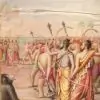Originally posted by: _LalithaJanaki_
I agree that the people of Ayodhya did not deserve to go to Vaikunta with Rama, but that's just me. What made Shri Ram Maryada Purushotham was his ability to forgive. He forgave the people of Ayodhya for their sin of making false allegations on Devi Sita, because they were equal to his children. Shri Ram was the ocean of Mercy, and he once proclaimed that he would even forgive Ravan for the insult of abducting Sita, had Ravan returned Sita with honor and asked for forgiveness from Shri Ram (can you imagine Ravan doing that?😉😆).
And I think Kush accepted Ayodhya as not to hurt his father's feelings and insult his acestors. Just because the people of Ayodhya sinned by speaking falsely about Sitaji, that did not make the sacred land of Ayodhya cursed. It was the people who sinned, not the land, so why should they take their anger out on the land by refusing it? Also, what about the descendants of those who spoke ill of Sita Devi? Shri Ram ruled the people who insulted Sita, so wouldn't Kush and Luv rule the descendents of them? Why take their anger out on the descendents, who were after all innocent?
Many Kings of the Ikshvaku Vansh were valiant, victorious, and renowned. They all ruled Kosala with Ayodhya as their capital city (I think). Ayodhya was the site where Rama performed many Ashvamedha yagnas, thus making the land even more sacred, Ayodhya was the place where Raja Dasharath performed the holy Putrakameshti Yagna, and Ayodhya was the site where King Raghu performed 100 Ashvamedha Yagnas. Ayodhya was a very holy city, and despite being the place where Sita was insulted, I think Kush did not want to insult the valour of his ancestors, and reject the place which was the birthplace of his father, Lord Vishnu himself.
Sita Mata herself forgave the people of Ayodhya before invoking the Earth Goddess, so why should Kush feel angry at Ayodhya when his mother herself was not?
And I don't think Vibhishna was referring to Shri Ram's divinity when he said Ramji may have known beforehand of Sitaji's exile. In the Treta Yug, a woman's virtue and chastity was given much importance. Shri Ram, knowing (not by his divinity but by his experience as a human living in the Treta Yuga) that people would doubt Sita's chastity because she lived in Ravan's city for 10 months, had Sita go through the Agni Pariksha for her own benifit.
But would this erase the doubt from people who had not seen the Agni Pariksha? Probably not. Shri Ram may not have known definitely that Sita may had to undergo an exile, but I believe he knew of the posibility, and that possibility may have created a gnawing worry for him, and when he heard the washerman commenting on Sita's virtue, his possible fears proved true.





























